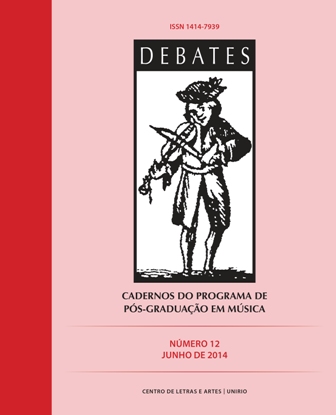A ideia de folk e as musicologias
Resumo
Resumo: Esse artigo pretende debater as circunstâncias histórico-sociais que conduziram à formulação do conceito de “folclore” e os usos que dele têm sido feitos pelos campos disciplinares dedicados aos estudos sobre música e cultura, enfocando especificamente sua relação com as transformações vividas pelas sociedades ocidentais na chamada modernidade, a partir de alguns das ideias de Pierre Bourdieu. Historicamente situado num momento de transição entre valores iluministas e românticos, além de crescente autonomização da obra de arte como sujeito estético, o nascimento da ideia de folclore parece revelar o lugar que passarão a ocupar as práticas musicais das camadas subalternas num cenário de constituição dos estados nacionais e aumento do distanciamento cultural entre grupos sociais letrados e iletrados. Pretende-se discutir ainda como o advento dos processos fonográficos de gravação sonora reposicionou o conceito frente aos campos disciplinares acadêmicos constituídos em torno do estudo da música. Finalmente, são abordadas questões sobre algumas formulações teóricas que sustentam o debate musicológico ainda hoje e definem termos utilizados nos estudos sobre a relação entre música e cultura nas sociedades contemporâneas.
Palavras-chave: Folclore. Cultura. Musicologia. Etnomusicologia
The idea of folk and the musicologies
Abstract: This article aims to discuss the historical and social circumstances that led to the formulation of the concept of "folklore" and the uses that have been made by those dedicated to studies music and culture, focusing specifically its relationship with the transformations experienced by western societies with the advent of so called modernity, from some of the ideas of Pierre Bourdieu. Historically situated in a moment of transition between Enlightenment and Romantic values, and growing autonomy of the artwork as an aesthetic subject, the birth of the idea of folklore seems to show the place that will occupy the musical practices of subaltern classes in a scenario of formation of national states and increase of cultural gap between literate and illiterate social groups. It also aims to discuss how the advent of phonographic sound recording processes repositioned the concept against academic disciplines constituted around the study of music. Finally, questions are raised about some theoretical formulations that still sustain the musicological debate and define the terms used in the studies of the relationship between music and culture in contemporary societies.
Keywords: Folklore. Culture. Musicology. Ethnomusicology


